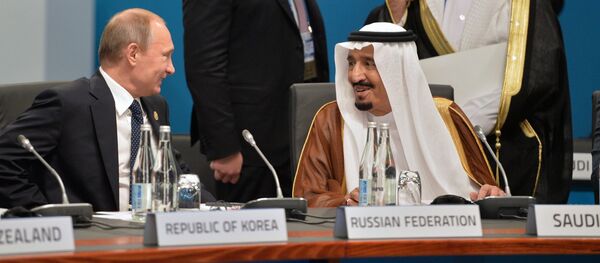This column revealed last week how Saudi Arabia had been unloading at least $1 trillion in US securities and crashing global markets — in parallel to its oil price war.
Excellent analyses are available on what's really happening with the oil markets, or the role of Wall Street in creating the oil crash. And yet the key piece in the puzzle remains the massive Saudi dump.
All the Fed had to do is to buy US Treasuries from Saudi Arabia. It is what the Saudis do with their US dollar credits that counts; they could, for instance, be buying gold to protect themselves in case of a future US dollar devaluation — assuming the Masters of the Universe would allow it.
If there are $8 trillion in stock securities and bonds, including Treasuries, as crack Persian Gulf traders are sure of, then Washington would have no further problems with the massive US deficit.
If the $8 trillion figure were leaked, Western corporate media would certainly go bananas; and inside Saudi Arabia that would stoke major unrest.
There's some public indication that forces in Washington are severely disturbed at Saudi actions. A serious player, the former Director of the Division of International Finance at the Fed from 1977 to 1998, explicitly said Saudi holdings of US Treasuries should no longer be secret.
This is meant as a stern message to Riyadh. And yet Secretary of State John Kerry went to Riyadh to assuage the House of Saud that nothing was amiss in the Beltway. So who is an increasingly paranoid House of Saudi going to believe?
This seems to spell out a scenario where a faction of the Masters of the Universe ordered the crashing of the market in stocks. And that implies divisions in the upper echelons of power. The former Fed executive is part of the old establishment. Not a neocon. The Saudis thought they had a green light to sell. Not really.
How About a Little Asset Freeze?
As a New York investment banker explains it, "the House of Saud was creating tremendous surpluses since the 1970s — when OPEC dramatically increased the price of oil." The US Treasury wanted this tsunami of cash to purchase US Treasury bonds; and the Saudis were always scared to show that tsunami in motion. So "a deal was worked out that they would keep the trillions of US dollars in bonds secret." There was never any question the Saudis would be allowed to sell bonds en masse.
The Saudis selling their stocks in the open market en masse, especially in the first weeks of January, spreading panic all around the world, appears to have seriously displeased another faction of the Masters of the Universe. This faction might eventually let everyone know what the secret Saudi position is in US Treasuries. Remember, we're talking about at least $8 trillion.
The House of Saud, predictably, is in total panic. Imagine a leak stating they are sitting on $8 trillion while asking the poor in Saudi Arabia for economic "sacrifices" to support their oil price war plus the unwinnable war on Yemen, fought with expensive mercenaries. A global uproar would be inevitable — claiming a freeze on Saudi assets that are being used to destroy world markets. A barely concealed secret is that the House of Saud is not exactly popular in all the crucial places, from Moscow to Washington and Berlin.
The House of Saud cannot possibly believe that the FSB, SVR and GRU deeply love them for trying to destroy Russia; that Texans love them for trying to destroy the shale oil industry; that Germany or Italy love them for dumping a trillion dollars in securities on the markets to crash them as Mario Draghi pumps major QE trying to rescue the eurozone.
The House of Saud remains in denial. Persian Gulf traders though mention the example of Sweden, where Saudis sold half the Swedish securities they owned, causing serious trouble in Swedish stocks. It's normal procedure to tell the markets you are buying when you are actually selling. The Saudis may even publicly buy something while secretly unloading in the market, using fronts that are not known to be connected to them.
Time to Сall a Сab?
Russia, meanwhile, remains on a serious diplomatic offensive. The fall of the ruble is good for Russian exports while lowering imports. Reserves are stable at a high level. Russian companies have deleveraged — and are no longer eating up foreign reserves.
The rate of economic decline has slowed. Sanctions — at least from the EU — will likely be lifted in 2016.
So it's time to find a cure to the energy market blues. As President Putin has diplomatically phrased it, Russia and Qatar now "feel the need to harmonize policies in the energy sphere, especially in the gas industry."
The Gulf gang at OPEC, led by Saudi Arabia, still insists OPEC will not cut production — as this would give up market share to rivals. But now Qatar — current OPEC president, and after talking to Moscow — is actually getting real, stating that oil could turn into a bull market before the end of year, as this column advanced.
Investments in the energy industry are dropping too fast while global demand continues to grow. Qatar's energy minister Mohammed al-Sada laid down the law: "The current price of oil is not sustainable and hence it should change."
The Kremlin, for its part, says there are no concrete plans — yet — to cut oil output in coordination with OPEC. Spokesman Dmitry Peskov only admits Russia is "actively discussing the instability of oil markets" with OPEC. The bottom line is Russia will cut back if OPEC does.
The ball is the House of Saud's court. The jig of crashing the oil price and dumping securities seems to be up. They'd better get their act together, or soon every "prince" may be driving cabs in London. Although serious doubts remain Warrior Prince Mohammed bin Salman has an IQ strong enough to master all the streets necessary to pass the exam.
The views expressed in this article are solely those of the author and do not necessarily reflect the official position of Sputnik.





